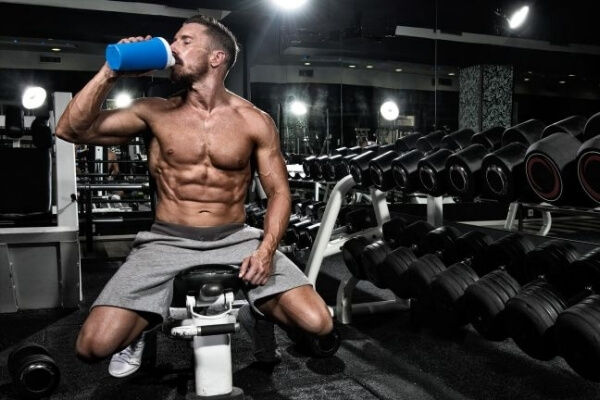Mass gaining supplements such as Optimum Nutrition’s Serious Mass, Mutant’s Mass and The Bulk Protein Company’s Serious Gainz are all popular amongst bodybuilders and are our top sellers in this field due to our fantastic prices and bundles.
High-quality mass-gainers offer optimum recovery from intense workouts, whilst also feeding your body with enough calories which will enable it to gain muscle. It is derived from a mix of protein, carbs and fats. The most common protein sources within the products are whey, casein and plant for vegans. If it is not a mass gainer you are after you can find our guide on the best value for money proteins here. The carbs in mass gainers usually come from Dextrose, Maltodextrin or Waxy Maize but the fat found in most mass gainers do not really have a standardised substance that goes in. In premium mass gainers, you can find a lot of BCAA, Creatine and Vitamins & Minerals in as brands look to make their products more well-rounded and versatile.
The Benefits of Using a Mass Gainer Instead of a Normal Whey
Help Build Muscle Faster
In 2013, the Journal of the International Society of Sports Nutrition conducted a study into whether carbohydrates are needed to further stimulate muscle protein synthesis/hypertrophy following resistance based exercises. The panel found that “no further beneficial actions of carbohydrates, irrespective of GI, are evident concerning muscle hypertrophy when a protein supplement that maximally stimulates muscle protein synthesis is ingested”. This basically means that the introduction of carbohydrates into a whey protein shake would have not have a noticeable benefit on its user than just a normal shake.
But even with that in mind, mass gainers typically contain higher grams of protein per gram which would help increase the synthesis in its own respect. However, as previously mentioned, brands are now starting to make their mass-gainers more well-rounded so there is now a lot of creatine inside mass-gainers rather than the normal protein/carbohydrates combination. Another study that was conducted in 2007 by Medicine & Science in Sport & Exercise found that when supplemented with creatine, protein and carbohydrates, mass-gainers become more effective than the traditional protein and carbohydrates combination.
When supplemented with the right diet and exercise program, the sheer number of calories found in mass-gainers feed the body in order to build muscle after an intense workout. However, a common misconception is that the body will just turn the number of calories left after exercise into muscle; but that is incorrect. Whilst there is a lot of calories, they are only the building blocks to help support your muscles grow to the size you desire.
Support Recovery and Improving Physical Performance
In order to increase muscle and muscle size, you need your body to always be in good shape to increase physical performance. When you are working out, you reduce your body’s stores of muscle glycogen (a form of carbohydrates your body uses for energy). Glycogen is used as the body’s primary source for energy, which is why if you go keto/reduce cabs you will lose energy. Increasing the rate of which your muscles glycogen is replenished after an intense workout will be extremely helpful for anyone looking to gain muscle as your glycogen level will effect on how well you are able to train at a consistently high level.
A study conducted in 2002 found that when you supplement protein and carbohydrates together, it led to an increase in the replenishment of muscle glycogen in the post-exercise recovery period more significantly than just a pure carbohydrate drink.
Improve Protein Balance
As everyone knows, the amount of protein you consume is important in any aspect in the recovery of the body or muscle growth. If you are looking to maintain muscle or increase it, you need to be synthesising enough protein. Exercise creates a negative protein balance in its user as you use up protein during exercise. This, therefore, may lead to slower muscle repair and muscle fatigue.
Traditionally, the best way to create a positive protein balance (more protein that you use) is to supplement exercise with protein powders/shakes. But the aforementioned paragraphs tell us that mass gainers contain a lot more protein than your average protein shake, making it ideal to keep a positive protein balance whilst still maintaining your body’s glycogen levels.
In 2004, the American Journal of Physiology, Endocrinology and Metabolism conducted a study which found that when you take a shake that contains a high amount of protein and carbohydrate, the users’ net protein balance was increased during rest periods as well as during exercise.
Possible Side Effects of Using Weight Gainers
As with anything, consuming too much of something can be detrimental to your health. Mass gainers that contain creatine can cause gastrointestinal problems, however, this can be easily managed by managing your dosage – we’ll explain how to do this later. Whilst on the topic of creatine-infused mass gainers, not increasing your water intake whilst supplementing can cause cramping, which no-one wants.
As previously mentioned, the body does not magically turn the unused calories into muscle but instead can lead to an increase in body fat. Unless your body is burning more calories than you are consuming, the calories that are left will turn into adipose tissue (fat).
Managing your Dosage
Your protein intake should be between 1.1 g to 3.1 g of protein per kg of your body weight, if you are wanting a positive protein balance it should be in the upper region of this estimate. There is no upper limit on how much protein can be taken in one meal, so there are no disastrous consequences if you take more protein than needed.
With mass gainers it depends on your individual goals, too much and your body fat will increase, too little and you will not feed your muscles enough nutrients to grow. It’s always best to conduct your own research into your individual, tailored needs to help you get the best results.
With creatine, you should take around 0.3g per kg of your body weight, however, they can lead to the above side effects, so it might be the best to stop taking it for a while and then onto lower the dosage if you begin to experience cramps or gastrointestinal problems. Always be sure to read the ingredients to make sure you are not overdoing it.


